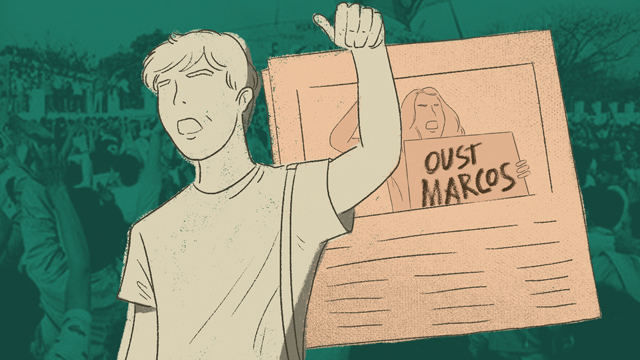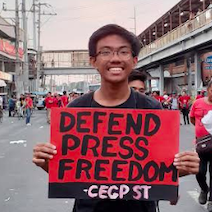

February 25, 1986 was a time of uncertainty.
I was not there personally to witness the march to freedom along Epifanio Delos Santos Avenue in the waning hours of Ferdinand Marcos’ dictatorship. But my elders were, and they illustrated to me what I suppose is the most definitive picture of that four-day popular uprising:
Tanks standing off with people wielding rosaries. Soldiers battling with both the people’s desire to break free and the Strongman's orders from the Palace. Two military officials and their forces hiding inside two military camps. Rebel soldiers having the bloodiest time of their lives reclaiming Marcos-controlled media outlets. Millions of Filipino bodies overcoming EDSA and nearby avenues to protect those who chose to brave the dictator and his army. (READ: Newspaper front pages during the 1986 People Power Revolution)
Soon enough, Marcos found himself chucked from the throne he had held for two long decades.
Marcos’ ouster, the demise of his reign of terror – that is supposed to be People Power’s end-goal. What happened, or should have happened, after EDSA is a different script Filipinos should have worked better on.
I always find it disconcerting to hear the opinion that EDSA was a "failure." A lot of Filipinos – whether Marcos apologists, Duterte loyalists, military die-hards, ordinary citizens, or activists from the Left – perceive EDSA as neither the historic collapse of Marcos’ tyrannical rule, nor a fresh start for a people browbeaten by 20 years of murder, corruption, and American-backed shenanigans. Instead, it is a terrible mistake or failure to them, and this speaks volumes about one monumental misconception about People Power. (READ: [OPINION] The most common misconceptions about EDSA People Power)
Tangible land reform; a turn for national industrialization; championing progressive economic policies; stamping out militarization in the countryside; significant bureaucratic reforms to end government thievery; an end to American imperialist intervention in Philippine economic, political, and even cultural spheres; the rapid alleviation of Filipino society’s grinding poverty and social inequalities – these are usually touted as EDSA’s goals.
But the thing is, none of these goals truly personifies People Power’s lone objective.
Overthrowing the US-Marcos dictatorship, and thereby giving people another chance to strive for social change, was and should be People Power’s sole sterling legacy.
Certainly, the innumerable protests that marred the US-Marcos dictatorship emphasized the clamor for substantial reforms. But to narrow down the discourse on People Power to the success – or failure – of Corazon Cojuangco-Aquino and her government’s pursuit of these democratic aspirations is an abysmal disservice to what EDSA is.
EDSA’s "failure," if there is one, can only be this: the euphoria following Marcos’ departure brought about a kind of optimism that we mistook for a revolutionary breakthrough.
If the aftermath of EDSA did not lead to ample social changes, this is not a blot on EDSA. We are still continuing to build our nation, to regain what our nation had lost. We continue to do this despite the post-Marcos governments’ complicity in maintaining mass poverty, neoliberal globalization, and exploitation.
Under Rodrigo Roa Duterte’s regime, the call to straighten EDSA’s crooked path should reverberate again. (READ: On 34th EDSA anniversary, groups slam Duterte for being 'Marcos-like')
People Power, for what it’s worth, did not fail us – all the anti-people presidents after Marcos did. The traitors who continue to thrive in bureaucracy did. Some segments of our population that decided to turn their back on EDSA’s vision did.
But not EDSA – and certainly not those who choose to continue what People Power started.
34 years have already passed, and now more than ever – under Duterte’s Marcosian regime, whose rise to power was, in the first place, also dependent on EDSA’s victory – we should take ourselves to task and rectify EDSA’s "failures." (READ: Duterte says shun 'petty political differences' but again skips EDSA anniversary rites)
As in 1986, genuine power resides in the people: to overthrow dictators, to struggle, and to effect genuine social change. – Rappler.com
Karl Patrick Suyat is the editorial head of Fiat Publication (the official publication of University of Perpetual Help Systems-Jonelta campus), the Laguna provincial spokesperson for Youth UNBOUND-ST, and a national democratic activist staunchly advocating against historical revisionism, fascism, and injustice.